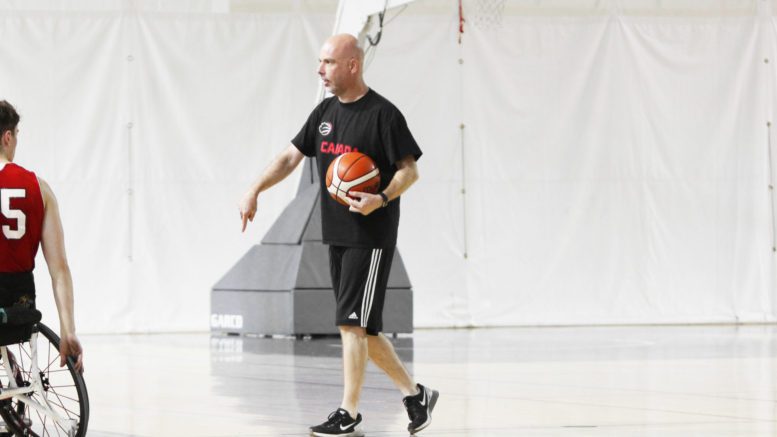Canada’s men’s wheelchair basketball head coach is worried the current athlete classification issue may force many athletes off the sport.
The International Paralympic Committee has removed the event from the 2024 Paris Games over athlete classification concerns and will also consider banning it from Tokyo’s edition if the sport’s international federation fails to alter classification rules.
The cause for disagreement comes down to wheelchair basketball recognizing far more impairment groups than the IPC.
“That is such a complicated situation,” said Matteo Feriani, Canada’s head coach by email in mid-March. “It’s a conflict between two different points of view, but I don’t honestly know how big is the gap.”
A range of 50 to 75 athletes would have to be reassessed as the IPC seems to be done with one of the most popular Paralympic sports having its own wider classification system that allows more disabled athletes to compete than every other at the games.
IPC President acknowledges the recognition the sport gets, but claims this does not mean that it should be above the rules.
“Athlete classification is integral to all Paralympic sport and the failure of any sport to comply with the IPC Athlete Classification Code is of critical concern to us because it could threaten the integrity of competition,” said Andrew Parsons in a January statement, when the actions were announced.
Although the International Wheelchair Basketball Federation (IWBF) stands behind its classification system, change is on its way.
“It is important to stress the eligibility of our athletes is not in doubt,” said Regina Costa, IWBF’s Chair of the Classification Commission in a January statement. “Merely we use different languages in our classification, and we believe that we have a most robust classification in our sport based on both medical and functional classification.”

COURTESY OF THE INTERNATIONAL BASKETBALL FEDERATION
While this position means that the possible bans are no cause for “problem nor worry”, according to Feriani, he says changing the current classification system is indeed a problem as it may force athletes to leave the sport.
“It’s a pity that people who cannot play the Olympic sport cannot even do the Paralympic sport, so they are like in a “middle class” where there is nothing.
“Socially it can be devastating for them and sport has always been one of the best social tools for human beings to develop,” Feriani said.
The Italian, who also serves as the head coach for the Toronto Rollin Raptors, believes the medical-functional classification system wheelchair basketball uses favours inclusion.
“I’m an able-bodied, and if I sit on basketball chair right now, I’m more disabled to play wheelchair basketball than most of the 4,5 class (athletes with minimal levels of disability) in the world. So, who are the handicapped on the chair?,” Feriani said.
In wheelchair basketball, players receive qualifications from 1 to 4.5, with the lower number meaning more restrictions. No team can exceed a combined 14 points on court and doing that would incur a technical foul.
Most athletes have normal arm and hand functions, with trunk control and sitting balance representing the biggest difference between classes as they impact the player’s ability to reach the ball, catch it and pass it.
“I wish our world would use the word “disabled” without considering it a negative word. Just recognizing that everybody in the world, nobody excluded, is disabled in something. Nobody is perfect.”
Matteo Feriani, Canada’s senior men’s national team head coach

Time and experience on Feriani’s side as Canada seeks to get back on top
Feriani has some strong allies in his task to get Canada back on top of wheelchair basketball.
The Italian was brought into the Canadian men’s team after its poor performance at the Rio 2016 Paralympic Games, when they finished last out of 6 in Group A and 11th overall.
He believes the Paralympics postponement caused by the COVID-19 outbreak can give him more time to further improve the squad.
“We are gaining one year,” Feriani said. “We will have one more year to work on the team’s chemistry and communication. We are getting older but we can get wiser.”
The physical consequences of the break are still impossible to predict as they don’t know when they’ll be able to get back on the court, Feriani said.
Other than time, experience is also on his side.
More than 15 years in the sport helped him learn Spanish, Portuguese, French, and English as he served as an assistant coach in his home country, Spain, Australia and Brazil.
These places have some differences when it comes to wheelchair basketball, he says.
“I found Australia and Canada to be more similar in the scientific support and they are advanced respect of Italy and Brazil. Recently, Brazil and Italy started implementing more of the scientific part too,” said Feriani.
These two countries, however, have better internal club competition, he said.
“The athletes are playing every weekend and for that reason are more used to being under pressure. Australia compensated by having the players competing in Europe in the different leagues while Canada has very few athletes doing that.”
Feriani helped coach the Oceania team in their silver medal campaign at the 2012 London Paralympics and their first World Championship gold medal at Birmingham 2010.
During his days in South America, he saw Brazil get a fifth place at the Rio 2016 Paralympics and a fourth at the 2015 Parapan American Games held in Toronto, where he lives today.
Canada men’s team qualified to the Tokyo Paralympics at the 2019 Parapan American Games held in Lima, where they lost on the final to the United States. The women’s team qualified in the same competition and won the gold medal against the U.S. team.

